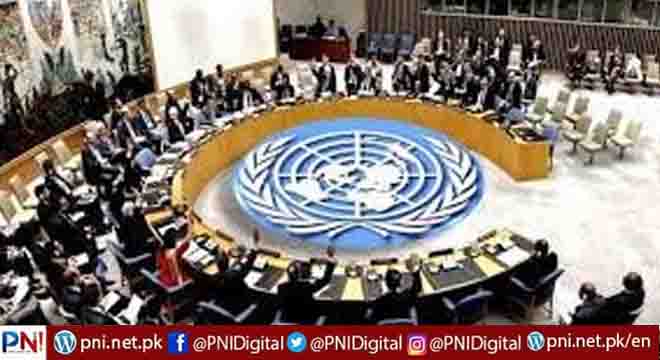UNITED NATIONS, Jun 03 (APP): Delegates of India and Pakistan clashed in the UN Security Council on Thursday, after the acting Pakistani Ambassador, Aamir Khan, cited Jammu and Kashmir as a glaring example of “brutal” Indian occupation that flouted international law for decades.
Indian delegate Kajal Bhat reacted to Ambassador Khan’s sharp words, claiming that Kashmir was an integral part of India and accused Pakistan of supporting terrorism against her country. She also alleged that Pakistan had committed “genocide” in former East Pakistan, now Bangladesh, during a high-level Council debate on strengthening accountability and justice for serious violations of international law.
Exercising his right of reply, Pakistan’s delegate Muhammad Rashid Subhani rejected India’s claim that Jammu and Kashmir was its part.
“Jammu and Kashmir is not and has never been a part of India,” the Pakistani delegate said, adding that Security Council resolutions define it as “disputed territory”, and printed as such on all official UN maps.
Among multiple resolutions, he said, Security Council resolution 47 (1948) clearly states that “the question of the accession of Jammu and Kashmir to India or Pakistan should be decided through the democratic method of a free and impartial plebiscite”.
India accepted this decision and is bound to comply with it, in line with Article 25 of the Charter of the United Nations, Subhani, a third secretary at the Pakistan mission to the UN, said. “Its refusal to do so, for over seven decades, constitutes a flagrant and perpetual violation of the Security Council resolutions and UN Charter.”
Only an occupier, he said, would oppose the implementation of Security Council resolutions which promise self-determination to the people of the disputed territory. “The state of Jammu and Kashmir still lingers as an unfinished agenda of decolonization,” pointing out that India’s talk about terrorism is nothing but a “smokescreen” to conceal its own state terrorism against Pakistan, in occupied Jammu and Kashmir and against its own minorities.
“Today, more than 200 million Muslims, Christians and other minorities face blatant discrimination in India,” Subhani said, citing discriminatory citizenship laws to expel Muslims; storming by charged mobs of mosques and churches, harassment and assault against worshippers, and encroachment over religious freedoms.
Dismissing India’s allegation against Pakistan of “genocide”, he said that New Delhi needed to do introspection.
“Genocide experts and academics, including Professor (Gregory) Stanton, are warning the world about impending genocide in India,,” he said,
“The racist and radical ideology of discrimination against minorities has unfortunately not only infected the society, but has also seeped into all the organs of the Indian state; the legislature, the executive and even the judiciary,” Subhani added.
“We ask the world, we ask this Council, to demand that India ends its state terrorism, and abides by its obligations under international law, including implementation of the UN Security Council resolutions.”
Follow the PNI Facebook page for the latest news and updates.








